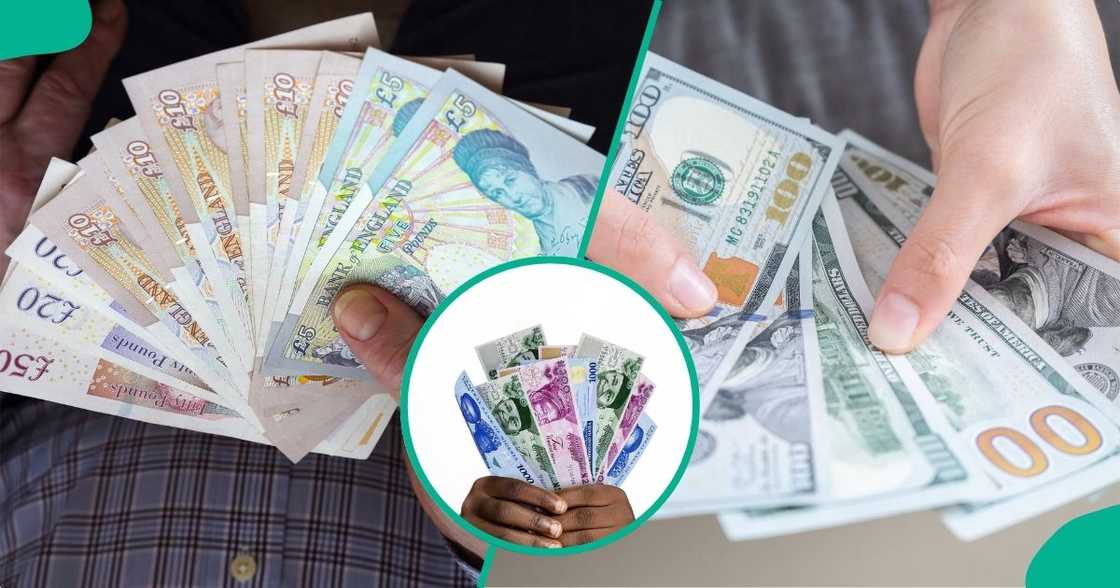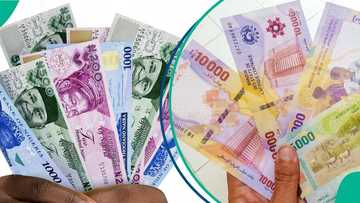AfDB Predicts New Naira Exchange Rates in 2025 as Dollar Rises in Official Market
- The African Development Bank (AfDB) has predicted that the naira and several other African currencies will depreciate in 2025 and 2026
- AfDB projected that the naira would lose six per cent of its value during the projected period, citing global economic shocks
- The AfDB report came as the naira depreciated against the US dollar in the official market on Wednesday, May 28, 2025
Legit.ng’s Pascal Oparada has reported on tech, energy, stocks, investment and the economy for over a decade.
The second half of the year will be challenging for the Nigerian currency, the Ghanaian cedi and 19 other African currencies.
This is according to a projection by the African Development Bank (AfDB), which predicted that the naira will fall by at least six per cent between 2025 and 2026.

Source: Getty Images
CBN raises hopes as AfDB predicts naira’s crash
The bank’s prediction comes after Olayemi Cardoso, the governor of the Central Bank of Nigeria (CBN), disclosed that the naira is now globally competitive and that the volatility in the foreign exchange market has reduced significantly.

Read also
AfDB warns of naira depreciation in 2025, predicts steep trends for other African currencies
Cardoso said the volatility declined by about 0.5%, citing improved monetary and fiscal reforms.
However, despite Cardoso’s optimism, the AfDB’s reports projected currency depreciation for 21 African countries in 2025, including Nigeria, Egypt, Ethiopia, Ghana, Libya, Rwanda, Zambia, and Zimbabwe, where currency depreciations are expected to occur at six per cent.
AfDB names robust African currencies
The bank attributed the depreciation trend in these countries to potential declines in export earnings, which may impact national currencies.
Meanwhile, the AfDB report expects that currencies in Kenya, Morocco, and CFA franc-using countries will experience a robust currency rebound by more than three per cent against the US dollar, supported by stronger market dynamics.
In 2023, AfDB said that 28 African countries experienced currency depreciation, but 17 of them reversed the losses or recorded a slower rate of decline.
AfDB recommends solutions
Nigeria is part of the category that has yet to experience currency depreciation recovery.
The report shows the role of global factors in shaping currency trends while pointing to domestic challenges such as unguarded FX frameworks, fiscal deficit monetisation, political instability, and low productivity.
AfDB asks that African countries boost domestic macroeconomic fundamentals, improve export capacity via value-added production, and implement strategic policies to reduce currency volatility.
The naira depreciates
Meanwhile, the naira experienced another round of depreciation in the Nigerian Foreign Exchange Market (NFEM) on Wednesday, May 28, 2025.
The local currency, which experienced an all-week rally last week, fell against the dollar, trading at N1,592 per dollar.
The naira has continued to depreciate at NFEM since this week despite interventions by the Central Bank of Nigeria (CBN), which sold $50 million to authorised dealer banks, Legit.ng reported.
The $50 million injection by the apex bank came after CBN sold $190 million to dealers the previous week.

Source: Getty Images
At the end of trading on Wednesday, May 28, 2025, currency dealers quoted the naira at a high of N1,595 and a low of N1,589.
10 Strongest Currencies in Africa in May 2025
Legit.ng earlier reported according to a new ranking, in April 2025, the Tunisian Dinar strengthened, emerging as Africa’s strongest currency at 2.95 per dollar.
The Tunisian currency’s gain was attributed to tight foreign exchange regulations, monetary policy tightening, and a stable economic environment.
In the review period, the cedi’s resurgence helped to reduce import costs.
Proofreading by Kola Muhammed, copy editor at Legit.ng.
Source: Legit.ng




